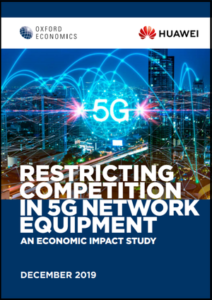Recent Release | 17 Dec 2019
The Economic Impact of Restricting Competition in 5G Network Equipment

Economic Consulting Team
Oxford Economics

A new global report by Oxford Economics sheds light on the potential costs of restricting competition in the provision of 5G network equipment (with regard to price, time, and productivity) across eight leading markets: Australia, Canada, France, Germany, India, Japan, the UK, and the US.
The next generation of mobile technology, 5G, offers enormous opportunities for countries who facilitate its widespread provision. Globally, the telecommunications network infrastructure market is dominated by three players: Ericsson, Huawei, and Nokia. However, the participation of one of these organisations—Huawei—in the rollout of 5G is likely to be constrained by a series of political decisions.

In the US and Australia, Huawei has been blocked from competing for further 5G infrastructure contracts in the wake of concerns expressed by the US government about the security of its equipment. In several other markets—including Canada, France, Germany, India, Japan, and the UK—respective governments have announced they are either considering exclusion or have imposed partial restrictions.
While it is widely accepted that such restrictions will be costly to businesses and consumers alike, there has been no systematic attempt to quantify the potential scale of these effects. In this context, Huawei commissioned Oxford Economics to assess the economic cost of restricting competition in the eight markets.
To reflect the uncertainty inherent in our analysis, we modelled three alternative scenarios—termed “low cost”, “central cost”, and “high cost”. The range of estimates corresponding to these three scenarios are presented in this report, which concludes that:
- Restricting a key supplier of 5G infrastructure from helping to build a country’s network would increase that country’s 5G investment costs by between 8% and 29% over the next decade. In the US, this translates to an average increase in investment costs of almost $1 billion per year over the next decade, under our central cost scenario.
- The increase in investment costs linked to the restriction of 5G competition would also delay 5G access to millions of people over the next decade. Linked to these investment cost increases, the restriction in competition for 5G infrastructure would lead to delays in the network rollout that mean millions fewer people would be covered by the 5G network in 2023.
- A delay in the rollout of 5G would also result in slower technological innovation and reduced economic growth. In our central cost scenario, this would result in reductions to national GDP in 2035 ranging from $2.8 billion in Australia to $21.9 billion in the US.
About the team
Our economic consulting team are world leaders in quantitative economic analysis, working with clients around the globe and across sectors to build models, forecast markets and evaluate interventions using state-of-the art techniques. Lead consultants on this project were:

Henry Worthington
Director, Economic Consulting
+44 (0) 203 910 8061

Henry Worthington
Director, Economic Consulting
London, United Kingdom
Henry Worthington is a Director for Economic Consulting in Oxford Economics’ consultancy division managing a team of economists in London across a diverse range of projects featuring economic impact modelling, macroeconomic modelling and forecasting and scenario analysis.
He joined Oxford Economics in September 2008, originally as part of the global macroeconomics team. As part of the macro team Henry assumed forecasting responsibility for a number of countries including Russia, Poland and Hungary. In May 2010, Henry moved to the consultancy team. He has since lead and managed a wide range of projects notably an evaluation of the economic benefits of unconventional oil and gas extraction in Tunisia, research into the economic impact of hotel investments on behalf of the IFC, building a macroeconomic model for forecasting and scenario analysis in Abu Dhabi and developing a macroeconomic model to assess the implications of the introduction of VAT in the Bahamas.
Henry was educated at the University of Cambridge, where he gained a first-class degree in Economics, becoming the William Stone Scholar of Economics, and an MPhil in Modern Society and Global Transformations.
Related Services

Post
The economic impact of abandoning the WTO
Oxford Economics have been commissioned by the International Chamber of Commerce (ICC) to provide an independent assessment of the economic impact of WTO dissolution. This report details our findings and the assumptions underpinning our analysis.
Find Out More
Post
The economic impact of the sports activities of public service media
This study shows how the sports activities of public service media supported €4.5 billion of GDP and 57,000 jobs across 31 European countries in 2022. The report also highlights wider economic benefits of public service media sports coverage, such as the way in which it leverages sponsorship income for sports bodies.
Find Out More
Post
Global Trade Education: The role of private philanthropy
Global trade can amplify economic development and poverty alleviation. Capable leaders are required to put in place enabling conditions for trade, but currently these skills are underprovided in developing countries. For philanthropists, investing in trade leadership talent through graduate-level scholarships is an opportunity to make meaningful contributions that can multiply and sustain global economic development.
Find Out More